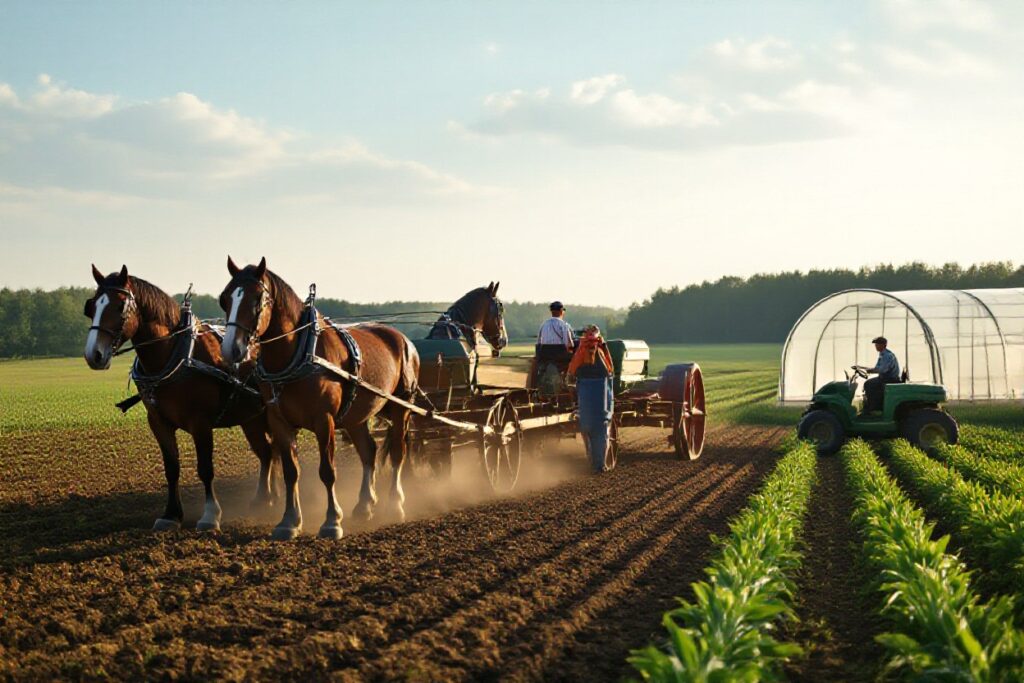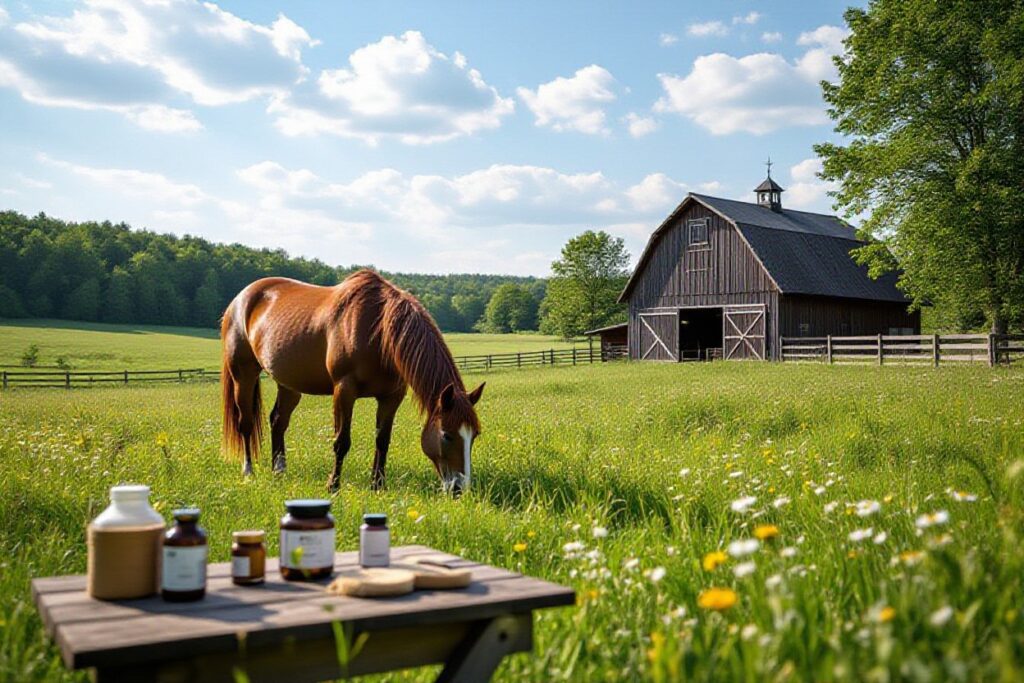There’s a significant difference in horse care during summer and winter seasons. To ensure your horse’s health and well-being year-round, it’s crucial to understand the specific needs they have in each season. In this blog post, we will provide you with vital tips and advice on how to best care for your horse during the hot summer months and cold winter days. By following these seasonal care guidelines, you can ensure your horse remains happy and healthy no matter the weather.
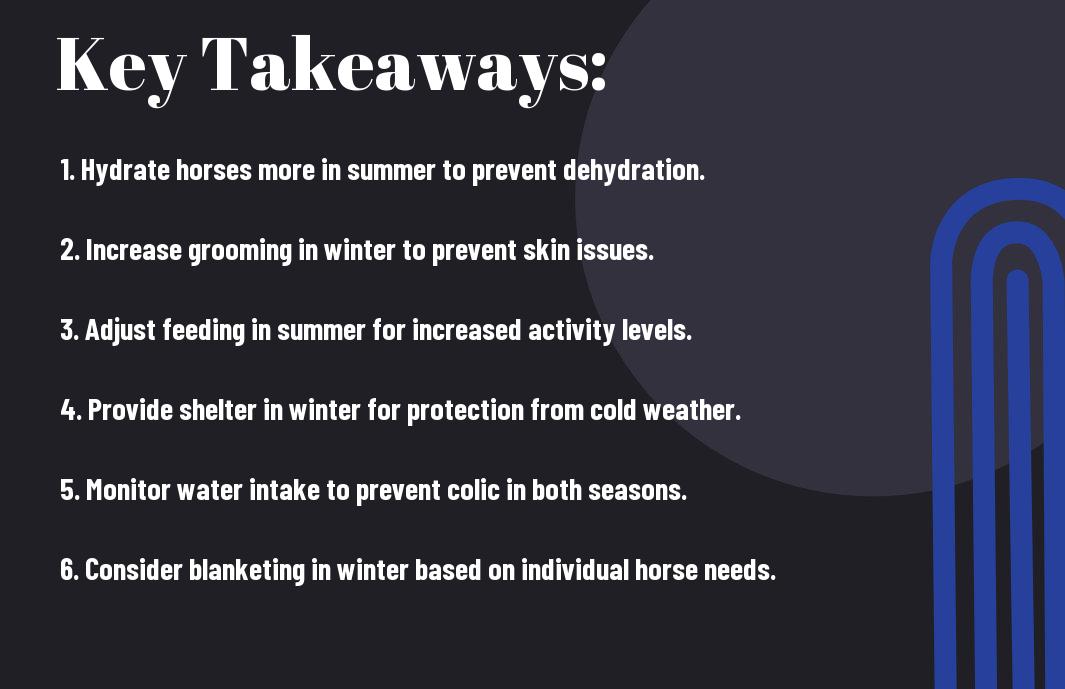
Seasonal Changes and Horse Care
How Seasonal Changes Affect Horses
For horses, the changing seasons bring about a range of environmental factors that can impact their health and well-being. With the transition from summer to winter or vice versa, horses must adapt to variations in temperature, daylight hours, and forage availability. These changes can affect their metabolism, coat growth, and overall energy levels.
Importance of Adjusting Care Routines
For optimal health and performance, it’s crucial to adjust your horse’s care routines with the shifting seasons. Your horse’s nutritional needs, exercise requirements, grooming regimen, and hoof care may need to be modified to suit the seasonal conditions. With proper adjustments, you can help your horse thrive throughout the year, preventing issues such as weight loss, coat problems, and inadequate hoof growth.
The importance of adapting your care routines to match the seasonal changes cannot be overstated. By tailoring your horse’s care to meet their specific needs during summer and winter, you can ensure they remain happy, healthy, and comfortable year-round. Consistency and attention to detail in your care practices will go a long way in supporting your horse’s well-being.
Summer Horse Care Tips
The summer months bring warm weather and sunshine, but they also present unique challenges for horse owners. Ensuring your horse stays healthy and comfortable during this season requires special attention to hydration, heat stress management, sunburn prevention, and pest control.
Adequate Hydration
Adequate hydration is crucial for your horse during the hot summer months. Make sure your horse always has access to fresh, clean water. You can add electrolytes to their water or feed to help them replenish lost minerals from sweating and exertion. Monitor your horse‘s water intake to ensure they are drinking enough to stay properly hydrated. Thirst is not always a reliable indicator of dehydration in horses, so pay attention to other signs such as dry gums, tacky saliva, or reduced skin elasticity.
On Managing Heat Stress
Managing heat stress is vital for your horse‘s well-being in the summer. Heat stress can lead to serious health issues like heat exhaustion or heat stroke. To prevent this, provide shady areas in the pasture where your horse can escape the sun’s direct rays. Consider using fans or misters in the barn to help cool the air. Additionally, schedule rides and training sessions during the cooler parts of the day, such as early morning or late evening, to avoid the peak heat hours.
Preventing Sunburn and Skin Issues
One way to protect your horse from sunburn and skin issues is to provide adequate shade in the pasture or turnout area. If your horse has pink skin or a light coat, apply a sunscreen specifically formulated for horses on exposed areas like the nose and ears. Regularly inspect your horse‘s skin for any signs of sunburn, insect bites, or skin irritations, and consult with your vet if you notice any abnormalities.
Controlling Pests and Flies
With the warmer weather comes an increase in pests and flies that can annoy and irritate your horse. Implement fly control measures such as using fly masks, fans, fly sprays, or fly traps in the barn and pasture. Keeping manure cleaned up regularly can also help reduce the fly population around your horse.
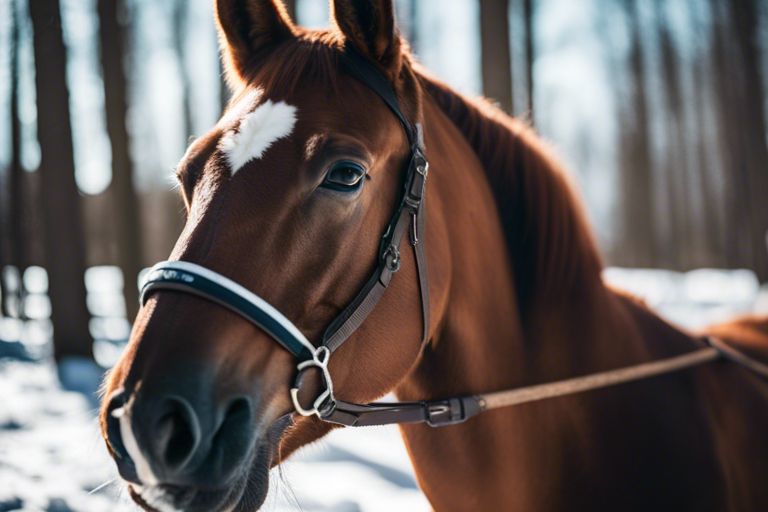
Winter Horse Care Tips
All **horse owners** know that **winter** can bring its own set of challenges when it comes to **horse care**. Here are some **tips** to help you **ensure** your **horse’s well-being** during the **cold months**:
Ensuring Proper Nutrition
One of the most important aspects of **winter horse care** is **ensuring** that your **horse** is **getting** **adequate nutrition**. **Winter** weather can make it **harder** for **horses** to **maintain** their **weight**, so **adjusting** their **diet** accordingly is **crucial**. **Consult** with your **veterinarian** or **equine nutritionist** to **determine** the **best** **feeding plan** for your **horse** during the **winter months**. **The** **right** **balance** of **hay**, **grain**, and **supplements** can **help** **keep** your **horse** **healthy** and **maintain** their **energy levels**.
Providing Adequate Shelter and Bedding
Care **for** your **horse** during the **winter** also **includes** **providing** **adequate shelter** and **bedding**. **Ensuring** that your **horse** has **access** to a **warm**, **dry shelter** can **help** **protect** them from the **harsh** **winter weather**. **Proper** **bedding**, such as **straw** or **shavings**, can **provide** **insulation** and **keep** your **horse** **comfortable**. **Providing** a **muddy paddock** or **pasture** can **lead** to **health** **issues** such as **thrush**, so **keeping** **living areas** **clean** and **dry** is **vital**.
Managing Cold Stress
Care **in managing cold stress** includes **being attentive** to **signs** that your **horse** may be **struggling** in the **cold**. **Shelter** your **horse** from **strong winds** and **wet conditions**, and **avoid** **overexertion** during **extreme** **cold**. **Be** **mindful** of your **horse’s** **body condition** and **behavior**, and **act** **promptly** if you **notice** any **signs** of **distress**.
Preventing Respiratory Issues
Respiratory **health** is **crucial** during the **winter months**. **Ensuring** that your **horse** has **access** to **fresh**, **clean water** at all **times**, and **monitoring** **humidity levels** in the **stable**, can **help** **prevent** **respiratory issues** such as **pneumonia**. **Proper ventilation** and **regular cleaning** of **stables** can **improve** the **air quality** and **reduce** the **risk** of **respiratory problems**.
By **following** these **winter horse care tips**, **you** can **ensure** that your **horse** **stays healthy** and **happy** throughout the **cold** **season**.
Hoof Care Considerations
Summer Hoof Care Challenges
With the hot summer months, your horse’s hooves face specific challenges. The dry and hard ground can lead to **cracked** hooves, which are not only **painful** for your horse but can also **increase** the risk of **infections**. Additionally, **excessive** exposure to **sunlight** can cause the hooves to become **brittle** and **weak**. To combat these issues, make sure to provide **regular** hoof **moisturization** and **avoid** riding on **hard** surfaces when possible.
Winter Hoof Care Challenges
The **winter** months bring their own set of challenges for hoof **care**. The **cold** and **moist** conditions can make your horse’s hooves **prone** to issues such as **thrush** and **cracked** heels. **Snow** and ice can also **build up** in the hooves, causing **discomfort** and **increasing** the risk of **injuries**. **Careful** daily **inspections** and **regular** **cleaning** of the hooves can help **prevent** these **problems**.
Care should also be taken to **address** any **minor** hoof **irregularities** promptly before they **escalate** into **more** **serious** conditions. Regular **farrier** visits **become** even **more** crucial in the winter to **ensure** your horse’s hooves are **trimmed** correctly and **balanced** to **bear** the winter conditions.
Year-Round Hoof Care Essentials
On **top** of **seasonal** challenges, there are **year-round** hoof **care** importants that **you** should **always** keep in **mind**. **Regular** **cleaning** of the hooves, **proper** **trimming**, and **balancing** are **vital** to maintain **healthy** hooves. **Adequate** **nutrition** and **hydration** play a **significant** role in the **overall** **health** of your horse’s hooves.
YearRound, **you** should **monitor** your horse’s hooves **closely**, looking for any **signs** of **issues** such as **discoloration**, **foul** odors, or **unusual** **sensitivity**. **Prompt** **attention** to these **signs** can **prevent** **major** hoof **problems** and **keep** your horse **comfortable** and **sound**.
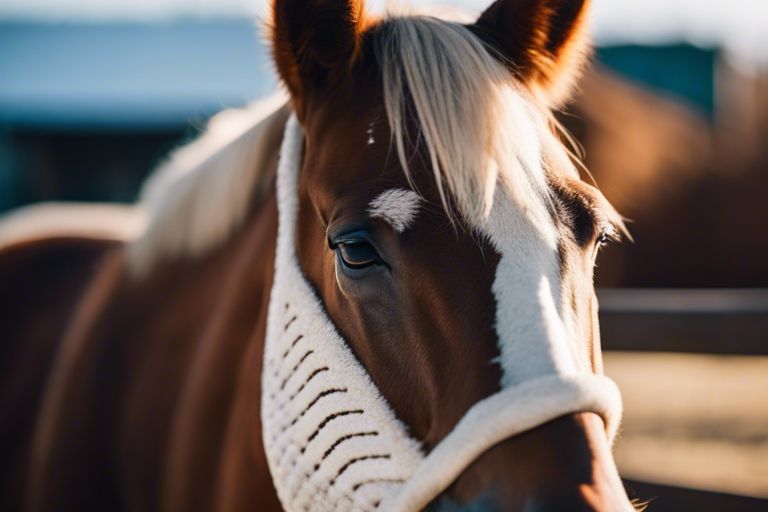
Vaccination and Health Check Schedules
Summer Vaccination Priorities
To ensure your horse stays healthy during the summer months, it is necessary to prioritize certain vaccinations. **Equine influenza** and **tetanus** vaccinations should be up to date as these diseases can spread quickly in warm and humid conditions. **Mosquito-borne diseases** like **West Nile Virus** should also be on your radar, especially if you live in an area where these pests are prevalent. Don’t forget to discuss **tick prevention** with your vet as well.
Winter Vaccination Priorities
The winter season brings its own set of health concerns for your horse. **Respiratory infections** are more common during this time, so **strangles and respiratory** vaccinations are crucial to keep your horse healthy. **Parasite control** is also important as horses tend to spend more time indoors, increasing the risk of parasite transmission. **Equine herpesvirus** vaccines may also be recommended, especially if your horse is in contact with other horses frequently.
**During winter, your horse’s immune system may be under more stress due to the cold weather and potential changes in routine.** It’s necessary to work closely with your vet to develop a vaccination schedule that considers these factors and keeps your horse protected throughout the season.
Regular Health Checks for Optimal Health
**Regular health checks** are crucial to maintaining your horse’s well-being all year round. **Dental exams**, **hoof care**, and **weight monitoring** should be part of your routine to prevent any potential health issues from escalating. **Blood tests** can also provide valuable insights into your horse’s overall health, helping you catch any issues early.
**Schedules for vaccinations and health checks may vary based on your horse’s age, health status, and living conditions.** Consulting with your vet and creating a customized plan for your horse will ensure they receive the best care possible, keeping them healthy and happy regardless of the season.
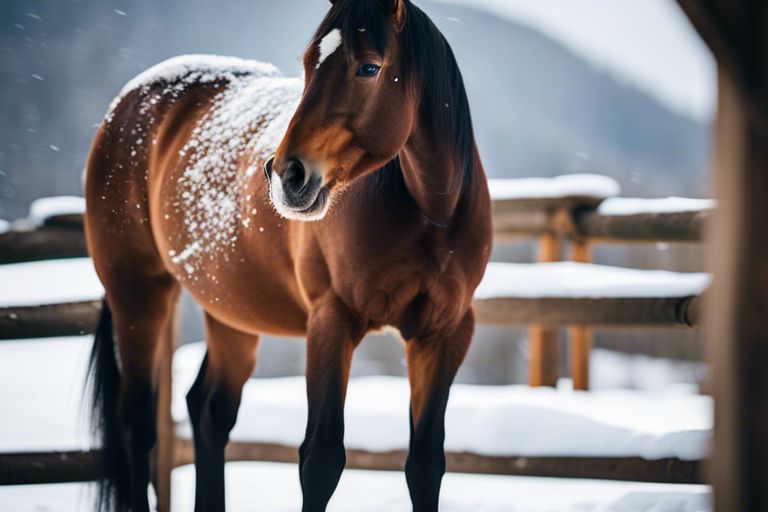
Nutrition and Dietary Adjustments
Summer Feeding Strategies
Adjustments to your horse’s diet are crucial during the summer months to ensure they stay healthy and hydrated. In hot weather, your horse will sweat more, leading to potential dehydration and loss of crucial electrolytes. To combat this, consider increasing their access to fresh, clean water and adding electrolyte supplements to their feed. Additionally, providing more frequent smaller meals throughout the day can help prevent digestive issues and maintain energy levels.
Winter Feeding Strategies
With the colder temperatures in winter, your horse’s nutritional needs change as well. They may require more calories to maintain their body temperature, so adjusting their feed to include higher fiber and fat content can help keep them warm and healthy. Consider offering more hay to stimulate digestion and provide additional heat through the fermentation process in their gut.
Understanding the impact of season changes on your horse’s dietary requirements is crucial for their overall well-being. By making appropriate adjustments to their feed based on the weather conditions, you can ensure they receive the optimal nutrition they need to thrive throughout the year.
Supplements for Optimal Health
One way to support your horse’s health is by incorporating supplements into their diet. **Supplements such as joint support formulas, probiotics for gut health, and vitamins for overall well-being can help address specific needs and promote optimal performance. Consult with your veterinarian or equine nutritionist to determine the most suitable supplements for your horse’s individual requirements.
Optimal health for your horse relies on a well-balanced diet and proper supplementation. By paying attention to their seasonal needs and providing the necessary adjustments, you can ensure they remain healthy and happy year-round.
Conclusion
Following this guide on seasonal horse care tips for summer and winter will help you ensure that your horse stays healthy and happy throughout the changing seasons. By paying attention to their grooming, nutrition, exercise, and living conditions, you can help your equine companion thrive no matter the weather.
Remember that each season comes with its own challenges and considerations, but with proper care and attention, you can provide your horse with everything they need to stay comfortable and well-cared for all year round. Your dedication to your horse’s well-being will not only benefit their health but will also strengthen the bond between you and your equine friend.
FAQ
Q: What are some summer care tips for horses?
A: Summer care tips for horses include providing ample shade and fresh water, applying fly spray to prevent irritation, adjusting feeding schedules, and regularly grooming to remove sweat and dirt.
Q: How should I care for my horse during the winter months?
A: Winter care for horses involves providing shelter from cold winds and precipitation, ensuring access to unfrozen water sources, adjusting feed for increased energy needs, and using blankets when necessary.
Q: How does exercise routine change between summer and winter?
A: In the summer, horses can benefit from early morning or late evening exercise to avoid the heat of the day, while in winter, it’s important to warm up slowly and thoroughly to prevent muscle strains in the cold weather.
Q: What are some common health issues to watch out for in horses during summer and winter?
A: Common health issues in summer include dehydration, heat stress, and insect bites, while winter may bring risks of colic due to changes in feeding, respiratory issues from dusty barns, and frostbite on extremities.
How can I ensure my horse’s hooves stay healthy in both summer and winter?
A: To maintain healthy hooves year-round, regular trimming and cleaning are imperative. In summer, watch for excessive drying and cracking, while in winter, be aware of snow build-up and ice accumulation that can cause slips and injuries.



